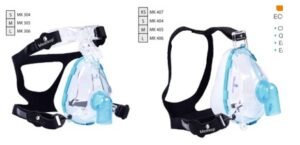When it comes to managing respiratory conditions, NIV (Non-Invasive Ventilation) face masks play a crucial role. These masks are designed to assist individuals who have difficulty breathing on their own, providing comfort and improving overall respiratory health. But how do they work, and why are they so important?
What is NIV?
NIV stands for Non-Invasive Ventilation, a method of delivering airflow to the lungs without needing invasive procedures like intubation. It’s commonly used for patients with chronic respiratory conditions such as Chronic Obstructive Pulmonary Disease (COPD) or sleep apnea.
How Do NIV Face Masks Work?
NIV face masks are connected to a ventilator, a machine that helps pump air into the lungs. The mask covers the nose, mouth, or both, depending on the type. The ventilator then delivers a continuous or variable flow of air, which helps keep the airways open and ensures adequate oxygen levels in the blood.
Types of NIV Masks
- Full-Face Masks: These cover the entire face, providing a good seal and ensuring that air is delivered effectively. They are ideal for patients who breathe through both their nose and mouth.
- Nasal Masks: These cover only the nose. They are often preferred for patients who only breathe through their nose and who find full-face masks uncomfortable.
- Nasal Pillows: These are small, soft cushions that fit directly into the nostrils. They are less obtrusive and are suitable for those who find larger masks cumbersome.
Benefits of NIV Face Masks
- Enhanced Breathing Comfort: By providing a steady flow of air, NIV masks reduce the effort needed to breathe, making each breath easier and more comfortable.
- Improved Sleep Quality: For individuals with sleep apnea, NIV masks help keep the airway open during sleep, reducing interruptions and leading to a more restful night.
- Reduced Hospitalizations: Regular use of NIV masks can help manage chronic respiratory conditions more effectively, potentially decreasing the frequency of hospital visits and improving overall health.
- Better Oxygen Levels: By ensuring a consistent airflow, NIV masks help maintain optimal oxygen levels in the blood, which is crucial for overall well-being.
Choosing the Right Mask
Selecting the right NIV mask involves considering factors like the patient’s specific condition, comfort preferences, and lifestyle. It’s essential to consult with a healthcare provider to find the best fit.
In summary, NIV face masks are an essential tool in managing respiratory health. They provide comfort, improve sleep, and help maintain proper oxygen levels. With the right mask, individuals with respiratory conditions can lead healthier, more comfortable lives.



